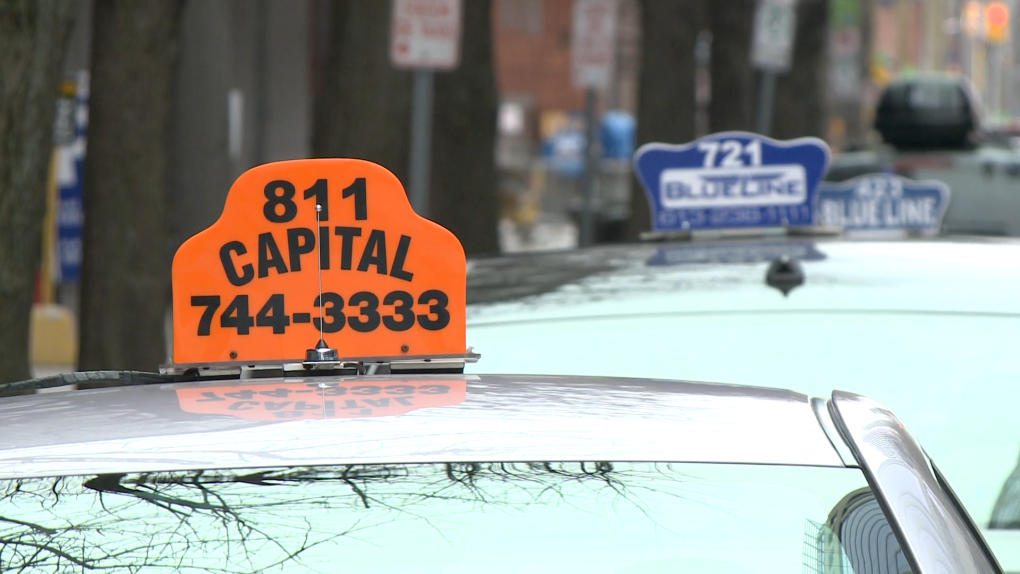The association representing taxi drivers in Canada is asking Amazon to stop selling fake cab signs on its marketplace over a growing number of card swap scams involving fraudulent drivers.
Canadian Taxi Association president Mark Andre Way sent a letter to the Seattle-based company, calling attention to a growing scam where criminals are able to fool victims with generic “taxi” signs on the roofs of their vehicles, many of which are available on the online marketplace.
Traditionally, roof signs are only available through specialty shops through the taxi industry, where the sellers are able to verify who made the purchase, and in most cases, installed the roof sign on the vehicle.
 A Capital taxi and BlueLine taxis await passengers in Ottawa. (CTV News Ottawa)
A Capital taxi and BlueLine taxis await passengers in Ottawa. (CTV News Ottawa)
“On behalf of the Taxi industry in Canada, I am requesting that Amazon to consider no longer selling generic ‘Taxi’ signs. We all fear that something much worse than a financial scam will be enabled by the disingenuous use of these Taxi signs by individuals who would misuse them to physically harm innocent persons,” Way said in a letter to Amazon’s president and CEO Andy Jassy.
“This is not a safe, practical way to distribute the trusted ‘Taxi’ signs which have become synonymous with physical and consumer safety for over a century.”
Amazon said in a statement to CTV News that safety is a top priority for the company and all products sold on their site comply with applicable laws and regulations.
“These lights are legal to sell in Canada and as a result can be listed for sale in the Amazon.ca store. Unfortunately, like many products, these products can be misused,” an Amazon spokesperson said in an email.
“Amazon will continue to monitor the situation and adapt to any developments on regulation and compliance of these items.”
Way said in an interview with CTV News that the company needs to take the issue more seriously.
“There’s the fraud issue, but there’s also a sexual assault issue, people could be picked up and driven somewhere wondering how they can get out of the vehicle. So, you have to think about that when you’re selling these things, they’re not necessarily public-friendly.”
The scam has been growing across Ontario and has been reported in Ottawa, Hamilton, Sarnia, Kingston and Toronto.
Ottawa police has been warning residents to be vigilant when approached by people asking to use your debit or credit card to pay for a taxi or rideshare.
The scam typically involves two suspects, one posing as a taxi driver and the other as a customer, and a vehicle that looks like a taxi parked in a high-traffic area.
The pair stage an argument over the taxi driver refusing to accept cash payment. Then a passerby is approached and asked to help by using their own debit card to pay in exchange for cash, according to police.
If the victim accepts, police say that when they enter their PIN, the terminal records the card information. After processing the payment, a fake bank card is handed back to the victim.
The scammers, now in possession of both the real debit card and PIN information, make fraudulent purchases.
Police report five taxi scams in one day
Way says if someone tells you their taxi driver isn’t accepting cash, that should immediately set off alarm bells.
“All drivers want cash and accept cash. So, there’s no reason why someone would turn around and a driver would not accept cash. It just doesn’t make sense,” he said.
Nasir Mehmood has been driving a cab in Ottawa for about five years and says most drivers still think cash is king.
“We actually prefer cash. We can use it right away. Otherwise, with other transactions, we have to go into our account and go into a bank to withdraw some money,” Mehmood said.
Ottawa Police say they are being inundated with fraud cases and it’s almost impossible to keep up.
“This scam was big a couple years ago. I believe we put out a press release in 2021, but it’s come back and apparently in the GTA it’s very big,” said Det. Shaun Wahbeh with the Ottawa Police Service Organized Fraud Section.
“Right now, frauds are rampant. We get 60 files per day of various fraud cases. A lot of it is internet-based, whether it’s Snapchat, Instagram, or crypto. That’s huge right now.”
Det. Wahbeh says Ottawa Police received five reports in a single day this week, but the total number of victims is likely far greater.
“Where there’s five reports, there’s 20 [victims] and over a weekend, means these people went around trying to hustle as many people as they can.”
In a statement on Aug. 12, the Ottawa Police fraud unit advised:
- Don’t accept to pay with your debit or credit card for someone else’s transaction even if you are offered monetary compensation, equivalent or superior to the original transaction amount.
- When making purchases, protect your PIN.
- Do not share your PIN with anyone.
- Choose a PIN that is not easy to guess – avoid birthdays and phone numbers, etc.
- Keep a close watch on your incoming bank and credit card statements.
With files from CTV News Ottawa’s Austin Lee